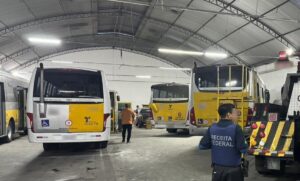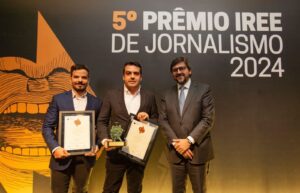A series of special reports from Brazilian newspaper Estadão revealed how the two largest criminal organizations in Brazil and militias infiltrated politics in the states of São Paulo and Rio de Janeiro, and how they operated to influence the 2024 municipal elections.

Garage of one of the bus companies investigated for alleged association with PCC. (Courtesy)
The investigative team reported that, among other things, the city of São Paulo paid R$827 million (about US$143.5 million) to bus companies investigated by the police for links with the Primeiro Comando da Capital (PCC), and that the conservative Brazilian Labour Renewal Party (PRTB) was led briefly in the state of São Paulo by someone who police accused of association with the criminal group.
“A source said this to me and I agree: today, Brazil is closer to becoming a narco-state than being able to clean up corruption and the involvement of organized crime in the public sector,” Estadão reporter Heitor Mazzoco told LatAm Journalism Review (LJR). “I was very surprised by the silent action and the infiltration in politics. When they start to operate like this, it’s no longer a group of criminals, it’s the mafia.”
In Brazil, organized crime is dominated by groups like the PCC, Comando Vermelho (CV), and militias, each operating with distinct structures and objectives. PCC, which originated in São Paulo’s prisons, is Brazil’s largest criminal faction, controlling drug trafficking routes and expanding its influence across Latin America. CV, historically rooted in Rio de Janeiro, also engages in drug trafficking and violent territorial disputes. Meanwhile, militias—often composed of former and active security forces—operate in Rio de Janeiro, extorting residents and businesses while controlling illegal services like land occupation and utility distribution. These groups fuel Brazil’s high levels of violence and corruption, deeply affecting public security and governance.
Work on the Estadão series began in November 2023 with a request from newsroom leadership to investigate the relationship between organized crime and municipal elections. Without much concrete evidence at first, the starting point was based on documents obtained exclusively by the reporting team. The dossier showed an investigation by police and the Public Prosecutor’s Office into the PCC's infiltration of public transport companies in the city of São Paulo.
“It’s impactful. We are talking about the largest city in Brazil, one of the largest in the world. What was known, even through our own investigation, was that there was infiltration in smaller cities, out of the spotlight. It’s shocking because it’s a city with visibility,” Mazzoco said.
After this first discovery, the investigation expanded to other regions of the country. The reporters showed how the northeastern states of Bahia and Ceará suffer from the influence of the CV and militias, and Rio de Janeiro from the militias. In the case of Ceará, the report showed that investigations by the Department for Combating Organized Criminal Actions (Draco), of the state's Civil Police, identified that Comando Vermelho not only financed candidates in the 2020 municipal elections, but also imposed political restrictions.
The objective of the series was to understand how these criminal factions influenced local politics and how this could impact the elections. In total, 12 articles were published throughout 2024 as part of the special, which won the main category of the journalism award from the Institute for Reform of State-Business Relations in November last year.
“I think the great merit of this series was to stop seeing it [the infiltration of organized crime] as a specific problem and start seeing it as a systemic problem, as something that was putting the State at risk. We expect the State to be made to guarantee common well-being and this was being completely undermined by the mafia-esque actions of these organizations,” Estadão reporter Marcelo Godoy told LJR. “The idea was to show people that this coexistence with organized crime no longer causes scandal. People have lost the ability to be scandalized, right?”
Reporters had access to confidential inquiries about the PCC through sources in the Public Prosecutor’s Office and the Civil Police. The team analyzed around 15 court cases, including those that were under secrecy, looking for evidence of links between candidates and criminal factions. Manual methods were used to cross-reference information, without the help of automated tools, in addition to the help of sources to access what was confidential. In the case of PRTB, the team discovered preliminary information about suspicions involving the political party from a series of documents that were delivered to the newsroom by an anonymous source.

The special report won in the main category of the journalism award from the Institute for Reform of State-Business Relations in November 2024. (Courtesy of Heitor Mazzoco)
“I thought the series would produce two weeks of publications, but it lasted months. With the visibility that the reports gained, information from anonymous sources began to appear. I received a package at the newsroom with a series of documents on the PRTB issue. I asked Godoy to help me, we investigated and the information was correct”, Mazzoco said.
In Rio de Janeiro, the report showed how the militias have been launching the candidacy of family members to maintain their influence in different parts of the state over the years. The investigation began with an initial survey of candidates who were investigated by the Public Prosecutor’s Office and the Civil Police of Rio for links with the militia. Data was also crossed with Divulgacand, the Superior Electoral Court (TSE) database, to map the relationships between these candidates and leaders or known names in crime.
“For me, the main challenge of this report was to tell a story about the militia, living in Rio de Janeiro. I was a little afraid of working with the issue especially during the election period, when there was a lot of ideological tension,” Estadão reporter Rayanderson Guerra told LJR. “Another issue was getting the other side from these people. Often they don't want to talk, or they deviate from the topic, so we usually don't get a clear answer from whoever is mentioned in the article.”
Despite the influence of criminal organizations being evident in the state of Rio de Janeiro, the number of elected candidates with these ties is relatively low, according to Guerra. However, the impact of criminal infiltration in politics in local communities is significant in that it limits democracy and influences the provision of services.
“During the electoral process in Rio, many neighborhoods and communities are restricted from having a democratic choice to vote. They are candidates pre-chosen by criminal groups and only they can campaign in those regions. This directly impacts the person’s vote,” Guerra said.
The reporters now intend to follow developments in the investigations that were the basis of the investigative series and also monitor upcoming elections, although the expectation is that these occurrences will be more frequent in municipal elections.
“If the PCC manages to elect a deputy it will only have one out of 513 parliamentarians. It is much more interesting for its members to have access to the Municipal Chambers, where garbage collection contracts and the rules of public transport and land use and occupation are discussed,” prosecutor Lincoln Gakiya, from the Special Action and Repression of Organized Crime Group (Gaeco), from the Public Prosecutor's Office of São Paulo, told Estadão.